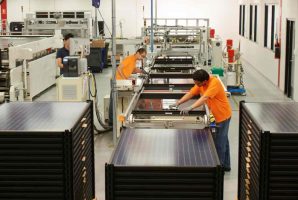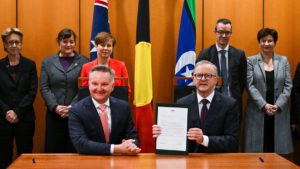Federal opposition leader Anthony Albanese has confirmed that a future Labor government would adopt a zero emissions by 2050 target for Australia, “with none of the absurd nonsense of so-called carryover credits,” but once again dodged dicussion of any interim emission reduction targets.
In notes from a speech delivered to the Per Capita thinktank in Melbourne on Friday, Albanese said the ALP would adopt “a real target, with none of the absurd nonsense of so-called carryover credits that the prime minister has cooked up to give the impression he’s doing something when he isn’t”.
“That’s not acting. It’s cheating, and Australians aren’t cheaters. A Labor government will never use Kyoto carryover credits.”
Taking the complete opposite tack to the federal Coalition, Albanese argued that taking action on climate change would mean “more jobs, lower emissions and lower energy prices” – and that practically everyone in society had accepted this as “a reality” but the Morrison government.
“All states and territories in Australia have already promised to operate in a carbon-neutral way by 2050,” the speech said. “The Business Council of Australia is calling for it. AGL, Santos, BHP, Amcor, BP, Wesfarmers, Telstra and others all agree. Seventy-three countries, including the UK, Canada, France and Germany, many with conservative governments, have already adopted it as their goal. Australia should too,” the speech notes said.
“We should be a clean-energy superpower, harnessing the wind and sun to spark a new manufacturing boom and power generations of jobs; developing a hydrogen industry; creating manufacturing jobs here in Australia in new industries that provide well-paid jobs.”
In the notes leaked to the mainstream press, however, there was no mention of Labor’s position on new coal power plants, its support (or not) for coal mining and export projects like the Adani Carmichael coal mine in Queensland, or any near-term emission reduction targets to set the pace for the net zero goal for 2050.
The latter omission is particularly disappointing, and concerning in that it hints of resistance from within party ranks, after Labor took a 45 per cent emissions reduction target by 2030 to the 2019 federal election and then lost.
As Michael Mazengarb reported on Thursday, there has been speculation the party would scrap that target given it was unlikely to be in a position to form government until 2022, at the earliest. Some within Labor have argued that the reduced timeframe makes it unreasonable to meet a 45 per cent reduction target within the eight-year window.
That said, the response to the Labor leader’s commitment to net-zero has been largely positive, with The Australia Institute welcoming the “community and business certainty” that such a target would bring – while also acknowledging that more policy work was required.
“A net-zero target by 2050 provides Australian communities and businesses with long-term certainty and direction,” said Richie Merzian, climate and energy program director at the TAI.
“More policy will of course be needed to work out how Australia meets this target in the short and medium term, however, having a long term goal is important in itself,” Merzian said.
“A net-zero by 2050 emissions target is the least of what is required to attempt to avoid dangerous climate change.
“The cost of climate inaction is estimated to be around $130.5 billion dollars per year, without even beginning to take into account climate disasters. As the recent bushfire emergency has demonstrated, the cost of climate disasters are high, far reaching and still being felt; and climate disasters are likely to be more extreme and come more often as climate change escalates.”
The Australian Industry Group was also cautiously supportive of Labor’s endorsement of a net-zero target, which it said was “increasingly widely supported” by business, industry advocates, community and governments.
“That growing consensus is important to guide and discipline the development of efficient, trade neutral and fair policies to get there,” Ai Group chief executive, Innes Willox, said on Friday.
“We shouldn’t underestimate the challenge of net zero, which goes well beyond generating cleaner electricity. Nor should we get too hung up on economic projections, which are about as reliable as trying in 1990 to estimate the cost and value of smartphones in 2020.
“Innovative technology can get us there and minimise the costs, as long as it is spurred on and scaled up by well-designed investment, regulatory and market policies. A successful transition will preserve international competitiveness and social equity all the way through to 2050 and beyond,” Willox said.










